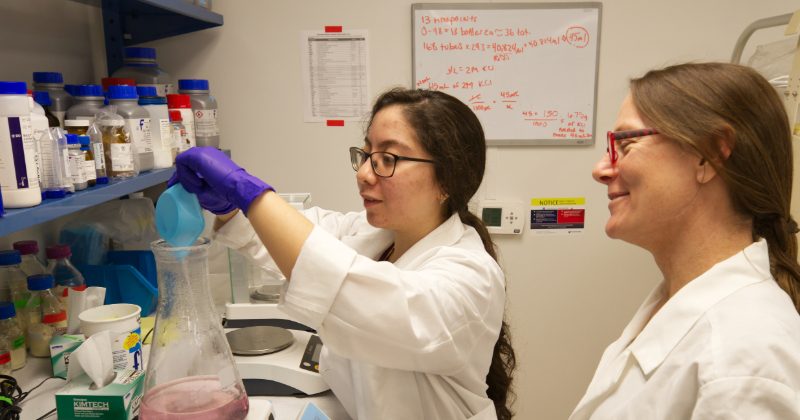
Category: Animal and Food Sciences

Animal scientist
August 31, 2020 Written by Dante LaPenta
Gisselle Garcia becomes first graduate of Non-Thesis Master of Science in Animal Science
Where will you be in five years? Back when she started as a University of Delaware undergraduate student in 2015, graduate school wasn’t a thought in Gisselle Garcia’s mind. Now with undergraduate majors in pre-veterinary medicine and animal biosciences and agriculture and natural resources already to her name, Gisselle Garcia is adding a Non-Thesis Master of Science in Animal Science. The new graduate program from the Department of Animal and Food Sciences (ANFS) was created to give aspiring veterinarians deeper hands-on experience, greatly improving their resume for highly competitive veterinary schools. While some use the degree to prepare for medical school or Ph.D. research, Gisselle kept her focus on vet school, which she began this summer at the Mississippi State University College of Veterinary Medicine.
As an undergraduate student as a tier one research university, the allure of the lab reeled in Garcia.
“I just got sucked into research,” she joked. “One of my friends said, ‘You should come down to the lab and do DNA extraction.’ I thought it sounded like fun. I was interested because it was related to horses and there was a direct veterinary application.”
Growing up in the suburbs of North Jersey, Gisselle was never around horses. Then she found herself on the University of Delaware Farm. She enjoyed her lab work under equine expert Amy Biddle so much that she added a minor in equine science.
Then as a senior, she learned that her department was creating the new graduate program. While the new degree was still in review by the Faculty Senate, Garcia picked the brain of Lesa Griffiths, ANFS’s undergraduate program coordinator. The business and entrepreneurial leadership concentration included core courses outside of the traditional animal science realm. With goals to eventually open her own practice, Gisselle liked the business and animal science courses offerings.
“The animal sciences master’s program is designed for completion in four semesters, but I completed it in only two. So, it’s possible to finish in one year, but I wouldn’t advise it,” laughed Garcia, who will be the program’s first graduate.
In this non-thesis track, Garcia focused on a project that she began as undergraduate student researcher in the Biddle Lab on the effects of non-steroidal, anti-inflammatory drugs on the equine microbiome — the root of maintaining a horse’s health and longevity.
So, after five years and two degrees in challenging programs, Garcia has lived and breathed the life of a Blue Hen scholar. She’ll miss the community feel of the College of Agriculture and Natural Resources (CANR) and the relationships that she’s forged with professors, farm managers and the students in her cohort.
“You build a close bond and get each other through the stressful times. What makes our college unique is the people and the professors’ expertise,” highlighted Garcia. They’ve done so much in their careers and stay so involved with the students. They want us to succeed so badly that they’ll go that extra mile.”
